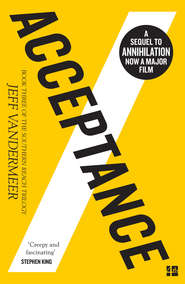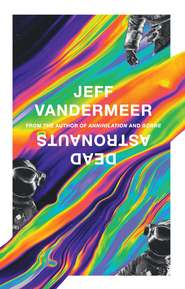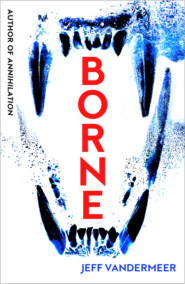По всем вопросам обращайтесь на: info@litportal.ru
(©) 2003-2024.
✖
The Strange Bird
Настройки чтения
Размер шрифта
Высота строк
Поля
They rode the wind in silence for several minutes, and the Strange Bird was content to recover in the dark wings’ company. But a prickling of her senses soon became an alert that the dark wings were probing the edges of her mind, the defenses the scientists had placed there. Walls the Strange Bird hadn’t known existed slid into place and, following certain protocols, a conduit opened while all else became a shield wall, sacrosanct.
Origin?
Purpose?
Destination?
Words that appeared in her head, placed there by the dark wings. She had no answer, but in approaching her, they had opened themselves up and because they were older, they had no sense yet of the danger, of how their own security had been breached by the complex mechanisms living inside the Strange Bird. Much of what was new in them, of their own making, had arisen solely to talk to each other with more autonomy, to become more like birds.
For the Strange Bird realized that, just like her, they were not strictly avian, and that unlike her, parts of them were not made of flesh at all. With a shock, she came to understand that, like living satellites, they had been circling the world for a vast amount of time, so many years she could barely hold them in her head. She saw that they were tasked with watching from above and transmitting information to a country that no longer existed, the receiving station destroyed long ago, for a war that had been over for even longer.
In their defenselessness, performing their old tasks, keeping data until full to bursting, erasing some of it, to begin again, the Strange Bird gleaned a view of the world that had been, saw cities cave in on themselves or explode outward like passionflower blooms opening, a tumbling and an expansion that was, at its heart, the same thing. Until there was just what observed from above, in the light and the dark, sentinel-silent and impartial, not inclined to judgment … for what would the judgment be? And how would a sentence be carried out now that all those responsible were dead and buried? But in these images, the Strange Bird knew that, perversely, the laboratory had functioned as sanctuary … just not for the animals kept there.
The dark wings needed no food. They needed no water. Ceaselessly they flew and ceaselessly they scanned the land beneath them, and never had their talons felt the firmness of a perch or their beaks food. The thought brought an almost human nausea to the Strange Bird.
Shall I set you free? she queried. And in a way, she meant to set the world within them free, too.
For she could see that this was possible, that with the right command, the dark wings would drop out of their orbits and think for themselves, in their way, and rejoin the landscape beneath them. What they would do then, she didn’t know, but surely this would be a comfort to them?
But the query alarmed the dark wings, tripped some internal security, lurching back online. All three gave out a mighty cry, and right there, beside her, they burst into specks of blackness that she could see were miniature versions of their larger selves and the specks dispersed into the thin air. The dark wings vanished as if never there and the Strange Bird’s heartbeat quickened and she flew higher still as if she could escape what she had seen.
Whether in a day or a week, the specks would find each other and bind together again, slipping into the old, familiar pattern, and once more three dark wings would glide across the invisible skin of the world on their preordained routes, performing functions for masters long dead. They might fly on for another century or two, dead-alive, until whatever powered them grew old or distant or the part of them that was flesh wore out.
Yet even as specks roiled by the buffeting wind, the dark wings communicated with one another. The Strange Bird could hear them, mote speaking to mote, sharing intel about her. Telling what must be lies.
Analysis
>>Composition: Avian, overlaid with Homo sapiens, other terrestrial life-forms. Unstable mélange.
>>Mission critical uncertain; synapse control override inconsistent with blueprint of original design. Interference 100 percent certain.
>>Conclusion: Sleeper cells exist. Unknown origin and intent.
>>Action: Avoid a void a void a void!
At dusk, she found a perch atop the rusted hull of a ship that had foundered there in the desert half a hundred years before. She was tired. A sadness had come over her as she had let herself drift across the skin of the sky, watched the desert transform into mountains of rusted electronics, of ancient caravans calcified and fossilized into the dunes.
With the sadness had come the knowledge that the Strange Bird could be mighty—and that she was almost as large as the dark wings. That her feet ended in talons meant to rend, to slice, to tear. That her beak was sharp and curved. That she did not need food like other birds, or did not need it often, could go without. In that, she was more like the dark wings.
As the hidden nocturnal life crept out at the margins and the wind slowed and deepened, the scent of animal musk welled up strong, and with it a metallic aftertaste, by-product of centuries of pollution. Constantly, the Strange Bird’s system purified itself of ghosts, of particles that could kill, all much smaller than a speck of dark wing.
The Strange Bird could see as she alighted there, in her newfound strength, the history of the place in her mind, it rising up as naturally as breathing. Below the ship were buried many others, in the sea of sand that had once been filled with salt water. Even that place, the depth of it, the detail, was almost too much to take in, the world overwhelming.
New things were rising in her, capabilities she didn’t know she had. They flickered on and then sometimes flickered off, as if the laboratory had not quite been finished with her. If she tried, the Strange Bird could reach out across the rim of the world, could feel life pulsing in all directions, even if hidden, even if sometimes in distress or marginal.
She tried to sleep, in the half-awake way that the Strange Bird slept. For always there was an eye inside of her that was awake.
The First Dream
In the dream, the Strange Bird sees a woman with black hair and brown skin peeling a piece of fruit, an apple, from the garden room, and cutting the pieces into pieces and putting them in a bowl. This woman she knows from the laboratory; her name is Sanji. The woman hands the bowl to another woman very much like Sanji but taller and with a rounder face, sitting on the couch next to her. She knows somehow that Sanji’s friend used to work at the lab, but left long before the Strange Bird’s own escape.
In front of them floats a moving image of other human beings talking and walking around. The women watch, joking and laughing. The Strange Bird can see the lab spreading out beyond them, still clean and new and fresh. The lights still work. There is still plentiful food.
Sanji feeds a piece of apple to her companion and says, “I save you from the bad apples. That’s my job. All these years, I’m the only reason you have not died from eating bad fruit. I am all that lies between you and that fate.”
The other woman laughs and squeezes her hand and a second name drops into the Strange Bird’s head, but when she wakes she cannot remember the name.
Only a sense of peace. Only the crisp taste of the apple.
The Storm
Headed ever southeast across the vast desert, the Strange Bird thought the world below looked so very old and so very worn, and only when she climbed to the right altitude could she pretend that it was beautiful.
The Strange Bird tried not to think of her dreams as she flew, for she could make no sense of them, hardly knew what a dream was, for it did not fit her internal lexicon and she had trouble holding in her head the idea of real and not-real.
Any more than did the prowling holograms that swirled up across the dead desert surface from time to time, performing subroutines from times so remote that nothing about them could be said to contain sense. Human figures welled up to walk, yet were composed of nothing but light. Sometimes they wore special contamination suits or astronaut suits. They trudged or they ran across the sands as if real, and then dissipated, and then came back into existence in the position where they had started, to again trudge or run, over and over.
Yet in watching this, the Strange Bird was reminded of the dream, and also of how detritus fell from her to the desert floor. Tiny bits of herself she did not need, and that she did not understand, for the way in which this material left her was too regular to be an accident, and she knew the compass inside her guided its distribution. Each time she regenerated the microscopic part that was lost so she could lose it once more.
In the laboratory, the scientists had taken samples from her weekly. She had lost something of herself every day. It was worse when they added something on, and then the Strange Bird had felt awkward, as if adjusting to an extra weight, and lurched off-balance on her perch, flapped her wings for hours until she felt settled again.
* * *
On the fifth day, just as the Strange Bird had become comfortable with this process—and the sun, the holograms, the cities, the higher elevations where the wind was so cold—a cloud blotted out the edge of the world, coming fast at her. She had not encountered a storm yet, but knew of storms, something inside of her programmed for evasion. But the cloud came at her too swift, too all-encompassing, and only at the last second did she see why: for it wasn’t a cloud at all but a swarm of emerald beetles, and the chittering sound they made as they flew scared her.
She tried to dive for ground cover but misjudged the distance, and the swarm overtook her like a wall, and she slammed into it, lost control of her wings, fell through a thick squall of beetles, progress slowed by their carapaces, righted herself in time to—head down like a battering ram and eyes shut—push through them even as they tore at her feathers and ripped along her belly.
Breaking free of them on the other side meant a lightness that surprised, and she rose more quickly than expected, caught in a tidal pool of air created by their passage. Thought herself free—only to spy just ahead the reason for the beetles’ panic: a real storm, spanning the horizon, and closing fast.
Emergency systems not triggered by the beetles switched on. A transparent sheath slid over her eyes and echolocation switched off so that she might rely on tracers and infrared in the midst of maelstrom.
Then the storm hit and she had nowhere to hide, no plan, no defenses, just the compass pulsing inside of her, and a body pummeled by winds gusting in all directions, trying only not to crash or be ripped to pieces.
The Strange Bird’s strength failed her, and she tumbled, rose and fell only because the wind willed it. Perhaps she called out before something dark with weight spun toward her out of the maelstrom. Perhaps she made a sound that was a person’s name as it struck her broadside, smashed her into a well of turbulence, knocked the consciousness from her. The Strange Bird could not remember later.
But whom could she have called for help? There was no one to help her, was there?
The Prison
When the Strange Bird regained consciousness, head ringing, she found herself in a converted prison cell in a building buried in the sand. Only the narrowest foot-long slit of window at the top near the ceiling revealed the presence of the sun. All was dark and all was hard—the bench set into the wall like a long, wide treasure chest was hard. The walls were hard. The black bars, reinforced with wire and planks of wood, so she could not slip out, were hard. No soft surface for relief. No hint of green or of any life to reassure her.
The smell that came to the Strange Bird was of death and decay and untold years of suffering, and the dim-lit view that spread out before her beyond the bars was of a long, low room filled with odd furniture. At the far end an arched doorway led into still more darkness.
The Strange Bird panicked, felt a formless dread. She was back in the laboratory. She could not find her way out. She would never truly see the sky again. Thrashed her wings and screeched and fell off the bench and onto the bare dirt floor and lay there beak open, wings spread out, trying to appear large and fearsome.
Then a light turned on and the gloom lifted and the Strange Bird saw her captor. The one she would come to think of as the Old Man.
He sat atop an overturned bucket next to a rotting desk and watched her, the rest of the long room still murky behind him.










